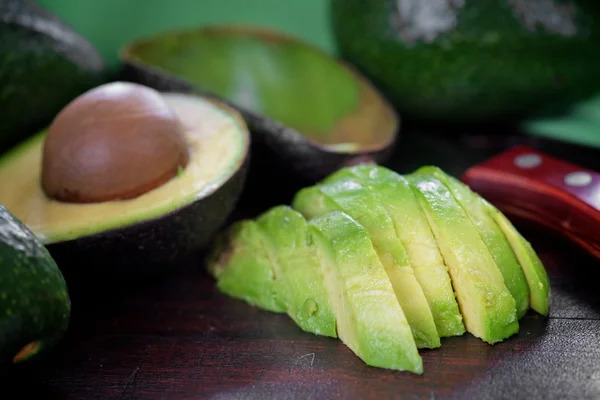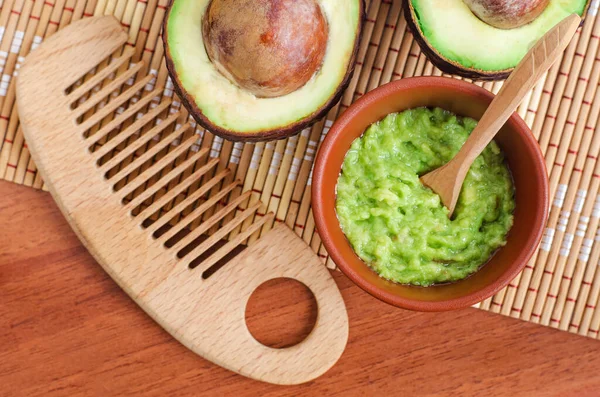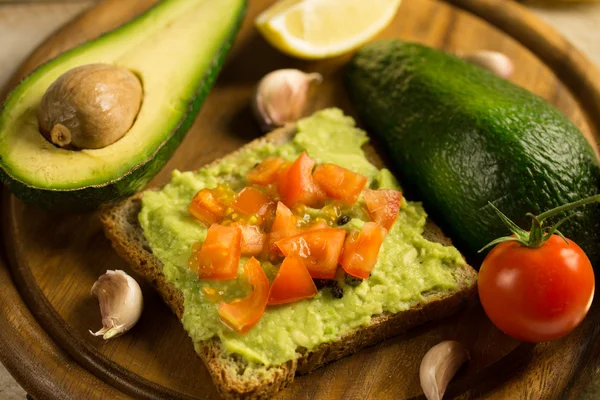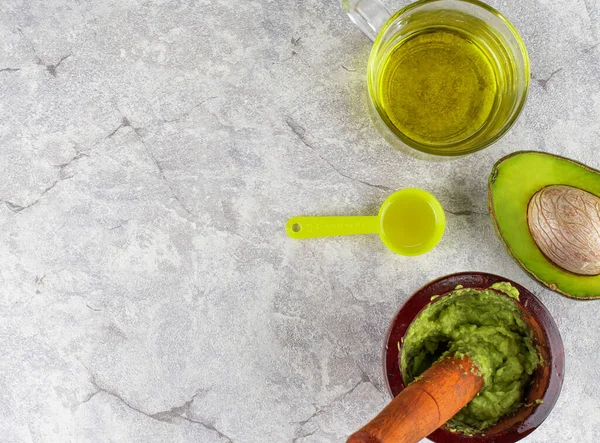Find out “Avocado Benefits for Skin, Hair and Health” – The avocado, sometimes called an alligator pear or butter fruit, is a fascinating fruit with a lot to offer! Although we often think of it as a vegetable, the avocado is technically a large berry, with a single large seed. It grows on evergreen trees in the Lauraceae family, native to Central America and Mexico. Different avocado varieties exist, each with its unique characteristics like size, shape, skin color, and flavor. Popular ones include Hass, Fuerte, and Bacon.

Avocado is rich in healthy nutrients. Here’s a table summarizing the nutritional value of avocados per 100g: USDA
Avocado isn’t just a delicious fruit; it’s a hair-nourishing powerhouse waiting to be unlocked! Its creamy goodness packs a punch of nutrients that can transform your locks from dry and dull to vibrant and healthy. Let’s dive into the incredible hair benefits of avocados:
Hair Growth: Avocados are a rich source of biotin, a B vitamin crucial for hair growth and health. Biotin deficiency can lead to hair loss and thinning. By incorporating avocados into your diet or using them in hair treatments, you’re providing your follicles with the fuel they need to grow strong, healthy hair.
Deep Conditioner: Forget the harsh chemicals! Avocado’s natural oils and fatty acids act as deep conditioners, penetrating hair shafts and locking in moisture. This leaves your hair soft, manageable, and free of frizz. Say goodbye to dry, brittle strands and hello to smooth, shiny locks!
Dandruff Destroyer: Dandruff can be embarrassing and irritating. The antifungal properties of avocados help combat the yeast that causes dandruff, leaving your scalp soothed and flake-free. Regular avocado hair treatments can keep dandruff at bay and restore your scalp’s natural balance.
Split End Savior: Split ends are the bane of anyone’s hair journey. Avocado’s rich oils and vitamins help repair damaged ends, strengthen hair strands, and prevent future breakage. Regular avocado treatments can leave you with smooth, healthy ends that frame your face beautifully.
Scalp Soother: Dry, itchy scalps can be a real pain. The anti-inflammatory properties of avocados can soothe irritation and reduce redness. Applying mashed avocado directly to your scalp can provide much-needed relief and promote a healthy scalp environment.
Great to see you read to this point, you may want to know the Onion Benefits for Skin, Hair, and Eyes after reading about avocado.
DIY Avocado Hair Treatments and Procedure

Their natural oils, vitamins, and minerals work magic on your tresses, leaving them soft, shiny, and healthy. Let’s explore some DIY avocado hair treatments and their procedures to unlock your hair’s full potential!
1. Deep Conditioning Mask
Perfect for: Dry, damaged hair
-
Ingredients:
- 1/2 ripe avocado, mashed
- 1 tablespoon olive oil
- 1 tablespoon honey
-
Procedure:
- Mash the avocado until smooth and creamy.
- Stir in the olive oil and honey until well combined.
- Apply the mask generously to your hair, focusing on the ends.
- Cover your hair with a shower cap or wrap it in a warm towel.
- Let the mask sit for 30 minutes to an hour.
- Rinse thoroughly with lukewarm water and shampoo as usual.
-
Benefits: This mask is a triple threat for dryness, damage, and frizz. Avocado’s fatty acids deeply condition your hair, while olive oil adds shine and honey seals in moisture.
2. Scalp Scrub
Perfect for: Oily scalp, dandruff
-
Ingredients:
- 1/4 ripe avocado, mashed
- 2 tablespoons brown sugar
- 1 tablespoon apple cider vinegar
-
Procedure:
- Mix the mashed avocado, brown sugar, and apple cider vinegar until you have a gritty paste.
- Gently massage the scrub onto your scalp in circular motions.
- Leave it on for 10 minutes.
- Rinse thoroughly with lukewarm water and shampoo as usual.
-
Benefits: This scrub exfoliates your scalp, removing dead skin cells and excess oil. Brown sugar acts as a gentle exfoliant, while apple cider vinegar balances your scalp’s pH and fights dandruff.
3. Hair Growth Serum
Perfect for: Thinning hair, slow hair growth
Additional Tips
- Use ripe avocados for the best results.
- Patch test any new ingredients on your skin before applying them to your hair.
- Avoid using metal utensils when mixing your masks to prevent oxidation.
- Store leftover masks in an airtight container in the refrigerator for up to 24 hours.
- Be gentle when massaging your scalp to avoid irritating it.
- Listen to your hair! Discontinue use if you experience any adverse reactions.
Health Benefits of Eating Avocado for Health
Avocado is a worthy addition to your diet for overall well-being. Here are what your health will benefit when you eat avocado in moderation.
Heart Health: Avocados are champions of good fats! They’re loaded with monounsaturated fatty acids, particularly oleic acid, which helps lower bad cholesterol (LDL) and raise good cholesterol (HDL). This translates to a healthier heart, reduced risk of heart disease, and improved blood pressure.
Digestive Health: Avocados are a fiber powerhouse! Their high fiber content promotes healthy digestion, keeps you feeling fuller for longer, and regulates blood sugar levels. This can benefit weight management, prevent constipation, and even reduce the risk of colon cancer.
Eye Health: Avocados are bursting with lutein and zeaxanthin, powerful antioxidants that protect your eyes from harmful free radical damage. This helps prevent age-related macular degeneration and cataracts, keeping your vision sharp and healthy.
Mineral Loaded: Avocados are a rich source of essential minerals like potassium, magnesium, and copper. Potassium helps regulate blood pressure and nerve function, magnesium aids in muscle and nerve function, and copper contributes to energy production and bone health.
Anti-inflammation: Chronic inflammation is linked to various health problems. Avocados’ anti-inflammatory properties help reduce inflammation throughout the body, potentially benefiting conditions like arthritis, autoimmune diseases, and even some types of cancer.
Vitamin Nutrients: Avocados are a veritable treasure trove of vitamins and antioxidants, including vitamin E, C, K, B6, and folate. These nutrients contribute to various bodily functions like immunity, cell health, energy production, and blood clotting.
Cognitive Booster: Studies suggest that avocados may benefit brain health and cognitive function. Their healthy fats and antioxidants may play a role in protecting against Alzheimer’s disease and improving memory.
Gut Microbiome Champion: Emerging research suggests avocados may be valuable allies for your gut microbiome. Their prebiotic fiber and diverse nutrient profile encourage the growth of beneficial gut bacteria, which in turn contribute to improved digestion, immune function, and even mental health.
Blood Sugar: Avocados’ healthy fats and fiber work together to slow down the absorption of sugar into your bloodstream, preventing spikes in blood sugar levels. This is particularly beneficial for people with diabetes or prediabetes, as it helps manage blood sugar and reduce the risk of complications.
Cancer Prevention Powerhouse: Studies suggest that the antioxidants and other bioactive compounds in avocados may play a role in cancer prevention. Avocados may help protect against various types of cancer, including breast, prostate, and colorectal cancers.
Natural Energy Source: Avocados are a good source of healthy fats and complex carbohydrates, which can provide sustained energy throughout the day. Ditch the sugar crash and embrace the avocado’s slow-burning fuel for a natural energy boost.
READ RELATED: Gabe Helmy Height, Weight, Age, Facts, Family
Sports Nutrition Superstar: The potassium and magnesium in avocados are crucial electrolytes for athletes. They help regulate muscle function, prevent cramping, and promote rehydration after exercise. So, next time you hit the gym, consider adding avocado to your pre- or post-workout routine.
Mood and Stress Management: Avocados are a good source of vitamin B6, which is essential for the production of mood-regulating neurotransmitters like serotonin. Additionally, their healthy fats and anti-inflammatory properties may help reduce stress and anxiety.
Skin Cancer Protection: The antioxidants and phytochemicals in avocados may offer some protection against sun damage and skin cancer. While sunscreen remains essential, incorporating avocados into your diet can provide an additional layer of protection. Remember, moderation is key. Avocados are calorie-dense, so enjoy them in reasonable amounts.
How Much Avocado should You Consume?
One-third to one-half of a medium avocado (around 50-80 grams) is considered a reasonable serving size. This provides approximately 80-140 calories, 6-9 grams of healthy fats, and a good dose of other essential nutrients.
For most adults, consuming 1-2 servings of avocado per day can be considered moderate. However, if you’re on a calorie-restricted diet or have specific health concerns, adjust your intake accordingly.
Listen to your body: Pay attention to your hunger and fullness cues. Don’t force yourself to finish a whole avocado if you feel satisfied before that.
NOTE: Consult your doctor before making significant dietary changes, especially if you have any underlying health conditions. Choose ripe avocados for optimal flavor and texture. Store leftover avocado properly to prevent browning.
Tips to Eat Avocado

- Spread mashed avocado on toast for a healthy breakfast.
- Blend it into smoothies and dips for a creamy, nutrient-rich boost.
- Use it as a natural salad dressing.
- Add it to omelets or scrambled eggs for added protein and healthy fats.
- Enjoy it as a healthy snack on its own or with a sprinkle of salt and pepper.
Avocado Recipes
1. Classic Guacamole
Ingredients:
- 1 ripe avocado, mashed
- 1/2 lime, juiced
- 1/4 red onion, finely chopped
- 1 tomato, finely chopped
- 1/4 cup chopped cilantro
- Salt and pepper to taste
Procedure:
- Mash the avocado in a bowl.
- Stir in lime juice, red onion, tomato, cilantro, salt, and pepper.
- Adjust seasonings to taste.
- Serve with tortilla chips, vegetables, or crackers.
2. Creamy Avocado Toast:
Ingredients:
- 1 slice of whole-wheat bread, toasted
- 1/2 ripe avocado, mashed
- 1/4 lemon, juiced
- Salt and pepper to taste
- Optional toppings: crumbled feta cheese, sliced tomatoes, chili flakes, poached egg
Procedure:
- Toast your bread to your desired level of crispness.
- Spread mashed avocado on the toast.
- Drizzle with lemon juice and season with salt and pepper.
- Add your desired toppings and enjoy!
3. Vegan Black Bean Burgers with Avocado Salsa:
Ingredients:
- For the burgers:
- 1 can black beans, drained and rinsed
- 1/2 cup cooked brown rice
- 1/4 cup chopped onion
- 1/4 cup chopped red bell pepper
- 1/4 cup chopped cilantro
- 1/2 teaspoon cumin
- 1/4 teaspoon chili powder
- Salt and pepper to taste
- For the avocado salsa:
- 1 ripe avocado, diced
- 1/4 red onion, finely chopped
- 1/4 cup chopped cilantro
- Juice of 1 lime
- Salt and pepper to taste
Procedure:
- Combine all burger ingredients in a bowl and mash together until well combined.
- Form into patties and cook in a skillet or grill until golden brown and cooked through.
- Prepare the avocado salsa by combining all ingredients in a bowl.
- Assemble your burgers with lettuce, tomato, and avocado salsa.
4. Spicy Avocado Tuna Salad:
Ingredients:
- 1 can tuna, drained
- 1/2 ripe avocado, mashed
- 1/4 cup chopped red onion
- 1/4 cup chopped celery
- 1 tablespoon sriracha
- 1 tablespoon lime juice
- Salt and pepper to taste
Procedure:
- Combine all ingredients in a bowl and mix well.
- Serve on toasted bread or lettuce wraps.
5. Decadent Chocolate Avocado Mousse:
Ingredients:
- 2 ripe avocados, mashed
- 1/2 cup unsweetened cocoa powder
- 1/4 cup maple syrup
- 1/4 cup almond milk
- 1/2 teaspoon vanilla extract
- Pinch of salt
Procedure:
- Blend all ingredients together until smooth and creamy.
- Divide into serving dishes and chill for at least 30 minutes before serving.
Tips:
- Use ripe avocados for the best flavor and texture.
- Taste and adjust seasonings as needed.
- Have fun experimenting with different toppings and flavor combinations!
How to Make Avocado Oil for Skin, Hair and Cooking

Making your own avocado oil can be a fun and rewarding experience, offering a fresh and potentially more nutrient-rich alternative to store-bought options. Here are three methods for making avocado oil for skin, hair, and cooking:
Method 1: Cold-Pressed Extraction (Best for Skin and Hair)
Ingredients:
- Ripe avocados
- Food processor or blender
- Cheesecloth
- Jar with tight-fitting lid
Instructions:
- Wash and dry the avocados. Cut them in half, remove the pits, and chop the flesh into small pieces.
- Pulse the avocado pieces in the food processor or blender until they form a smooth paste.
- Line a bowl with cheesecloth and place the avocado paste on top.
- Gather the edges of the cheesecloth and twist to squeeze out the oil. Collect the oil in a jar.
- Repeat the squeezing process with fresh avocado paste until you have the desired amount of oil.
- Store the oil in a cool, dark place, ideally in the refrigerator, for up to 2 weeks.
Method 2: Heat-Infused Extraction (Best for Cooking)
Ingredients:
- Ripe avocados
- Oven
- Baking sheet
- Parchment paper
- Strainer
- Glass container with a lid
Instructions:
- Preheat the oven to 200°F (93°C).
- Slice the avocados in half and remove the pits.
- Spread the avocado slices on a baking sheet lined with parchment paper.
- Bake for 1-2 hours, or until the flesh is golden brown and slightly dry.
- Allow the avocado slices to cool slightly.
- Scoop out the flesh and place it in a blender or food processor. Pulse until it turns into a fine powder.
- Transfer the powder to a glass container and cover it with olive oil.
- Let the mixture infuse for at least 24 hours, stirring occasionally.
- Strain the oil through a cheesecloth into a clean container.
- Store the oil in a cool, dark place for up to 3 months.
Method 3: Cold-Infused Extraction (Simple and Safe for All Uses)
Ingredients:
- Ripe avocados
- Glass jar with a tight-fitting lid
- Carrier oil (optional)
Instructions:
- Wash and dry the avocados. Cut them in half, remove the pits, and coarsely chop the flesh.
- Place the avocado pieces in a clean glass jar.
- If desired, add a carrier oil like olive or jojoba oil to cover the avocado pieces.
- Close the jar tightly and store it in a cool, dark place for at least 4 weeks, shaking occasionally.
- Strain the oil through cheesecloth into a clean container.
- Store the oil in a cool, dark place for up to 3 months.
Tips:
- Use only ripe avocados for the best oil quality.
- Be aware that avocado oil can have a short shelf life, so use it within the recommended timeframe.
- When using avocado oil for cooking, remember it has a lower smoke point than some other oils, so it’s best for low-heat cooking methods like drizzling or salad dressings.
- Patch test any homemade avocado oil on your skin before applying it to a larger area, especially if you have sensitive skin.
DON’T MISS: Broccoli Nutrition Facts, Health Benefits, and Recipes
Additional Resources
- https://pubmed.ncbi.nlm.nih.gov/23571649/
- https://www.webmd.com/food-recipes/all-about-avocados
- https://www.healthline.com/nutrition/avocado-nutrition
- https://www.webmd.com/vitamins/ai/ingredientmono-890/avocado
- https://www.healthline.com/health/avocado-benefits-for-skin
- https://www.hairfinity.com/blogs/news/4-awesome-benefits-of-an-avocado-hair-mask
- https://www.bebeautiful.in/all-things-skin/everyday/avocado-benefits-for-your-skin-and-hair
Note: This article is written based on scientific evidence found by the soundhealthandlastingwealth.com team. Sources are duly referenced.







